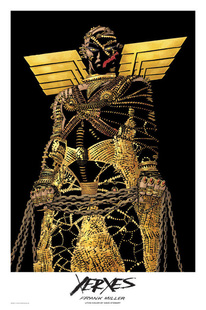 Frank Miller's rendition of Xerxes for his graphic novel
Frank Miller's rendition of Xerxes for his graphic novel King Ahasuerus was most likely also the same king known as Xerxes and Artaxerxes II Mnemon. He was one of the most powerful ancient kings. He ruled Persia for 46 years from 404 to 358 BC. He is portrayed in the Frank Miller’s graphic novel 300 as an unbeatable and terrifying giant warrior king. History remembers him as powerful, wealthy, and a great king with but not quite as evil as Frank Miller would have us think.
Verses 1-9 describe him,
Now in the days of Ahasuerus, the Ahasuerus who reigned from India to Ethiopia over 127 provinces, 2 in those days when King Ahasuerus sat on his royal throne in Susa, the citadel, 3 in the third year of his reign he gave a feast for all his officials and servants. The army of Persia and Media and the nobles and governors of the provinces were before him, 4 while he showed the riches of his royal glory and the splendor and pomp of his greatness for many days, 180 days. 5 And when these days were completed, the king gave for all the people present in Susa the citadel, both great and small, a feast lasting for seven days in the court of the garden of the king's palace. 6 There were white cotton curtains and violet hangings fastened with cords of fine linen and purple to silver rods and marble pillars, and also couches of gold and silver on a mosaic pavement of porphyry, marble, mother-of-pearl and precious stones. 7 Drinks were served in golden vessels, vessels of different kinds, and the royal wine was lavished according to the bounty of the king.8 And drinking was according to this edict: “There is no compulsion.” For the king had given orders to all the staff of his palace to do as each man desired. 9 Queen Vashti also gave a feast for the women in the palace that belonged to King Ahasuerus.
For 180 days the king showed the riches of his royal glory and his greatness. That is a nearly six months of showing himself off. But it made people understand that he was not someone to be reckoned with. Afterward, he threw a week long feast for the men and His wife Queen Vashti hosted a similar feast for the women. Wine flowed freely and after a week of partying and drinking the king decided to brag about and show off his beautiful wife. Verses 10-12 read,
On the seventh day, when the heart of the king was merry with wine, he commanded Mehuman, Biztha, Harbona, Bigtha and Abagtha, Zethar and Carkas, the seven eunuchs who served in the presence of King Ahasuerus, 11 to bring Queen Vashti before the king with her royal crown, in order to show the peoples and the princes her beauty, for she was lovely to look at. 12 But Queen Vashti refused to come at the king's command delivered by the eunuchs. At this the king became enraged, and his anger burned within him.
The king and queen were by no means equal. She was queen, but had no power except to give birth to an heir. She was in every way subservient to the king and the only power she had was to try and sway him. If the king called her, it was her responsibility to obey. She had no right to refuse him. Perhaps her privileged position as the chosen wife of King Ahasuerus made her feel entitled. She was his only legal wife, though he had many concubines. History infers that they loved one another or at least he loved her.
I think that sometimes we can tend to forget that God chose us, not because of anything we did, but simply because He loves us. He thinks we are beautiful and wants the world to see it. God chose Israel too and pride caused her to forgot the privilege of her position as God’s chosen nation and begin disregarding God’s law.
I imagine Vashti was showing off in front of the women. She was hosting a party to honor the king’s riches and power but she was parading it as her own. When the king called her, she didn’t want to be humiliated by proving herself a servant; she wanted to demonstrate her own power over him by refusing him. The women might have been impressed and likely shocked, but Vashti’s pride would cause a problem for her and for them.
God loved Israel enough to become very angry with her. Ahasuerus loved Vashti enough to become angry and he reacted in his rage. Verses 13-15 read,
Then the king said to the wise men who knew the times (for this was the king's procedure toward all who were versed in law and judgment,14 the men next to him being Carshena, Shethar, Admatha, Tarshish, Meres, Marsena, and Memucan, the seven princes of Persia and Media,who saw the king's face, and sat first in the kingdom): 15 “According to the law, what is to be done to Queen Vashti, because she has not performed the command of King Ahasuerus delivered by the eunuchs?”
The king was prudent enough to have advisors, but one wonders if he didn’t lean too much them. He perhaps was not wise enough to consider the ramifications of their advice. Throughout the book of Esther he tends to listen to his wise men and just do whatever they tell him to do. Verses 16-20 record the opinion they gave the king.
Then Memucan said in the presence of the king and the officials, “Not only against the king has Queen Vashti done wrong, but also against all the officials and all the peoples who are in all the provinces of King Ahasuerus. 17 For the queen's behavior will be made known to all women, causing them to look at their husbands with contempt, since they will say, ‘King Ahasuerus commanded Queen Vashti to be brought before him, and she did not come.’ 18 This very day the noble women of Persia and Media who have heard of the queen's behavior will say the same to all the king's officials, and there will be contempt and wrath in plenty. 19 If it please the king, let a royal order go out from him, and let it be written among the laws of the Persians and the Medes so that it may not be repealed, that Vashti is never again to come before King Ahasuerus. And let the king give her royal position to another who is better than she. 20 So when the decree made by the king is proclaimed throughout all his kingdom, for it is vast, all women will give honor to their husbands, high and low alike.”
In his anger this advice seemed sage. Mecuman had his own agenda; other noble women (his wife included) would not put up with the men as their masters if the king let the queen get away with insubordinate behavior. They would begin to question and disobey their husbands. They likely already were, Prince Memucan wanted an obedient and submissive wife. He played on Ahasuerus’ machismo and pride. Since King Ahasuerus was already angry he wasn’t thinking clearly and he heard Memucan’s counsel and went for it. Verses 21-22 read,
This advice pleased the king and the princes, and the king did as Memucan proposed. 22 He sent letters to all the royal provinces, to every province in its own script and to every people in its own language, that every man be master in his own household and speak according to the language of his people.
The edict sent out made women second-class citizens all because Vashti pride led her to disobedience, and the king’s pride and anger led him to a rash and foolish decision. What has pride done in your life? Pride is dangerous. It brings people down, and since it causes us to exalt ourselves so high, the fall is a long and hard one. Proverbs 16:18-19 says it this way,
Pride goes before destruction,
and a haughty spirit before a fall.
19 It is better to be of a lowly spirit with the poor
than to divide the spoil with the proud.
God’s Kingdom is backward from the way the world sees it. Honor doesn’t come from us lifting ourselves up, it comes from the ability to submit, to bow down and be lifted up. Jesus described it this way in the parable recorded in Luke 14:8-11,
“When you are invited by someone to a wedding feast, do not sit down in a place of honor, lest someone more distinguished than you be invited by him, 9 and he who invited you both will come and say to you, ‘Give your place to this person,’ and then you will begin with shame to take the lowest place.10 But when you are invited, go and sit in the lowest place, so that when your host comes he may say to you, ‘Friend, move up higher.’ Then you will be honored in the presence of all who sit at table with you. 11 For everyone who exalts himself will be humbled, and he who humbles himself will be exalted.”
Although it doesn’t say it in this chapter, we know that the king obeyed Memucan and banished the queen and sought someone to replace her (Esther 2:1-4). Like Israel was banished to captivity for her pride, Vashti was banished from the king’s presence for hers.
Our pride can keep us from The King as well. It can make us unwilling to obey, unwilling to acquiesce, and unwilling to hear reason. Rather than answer the call to be with Him, we will promote our own agenda and stand on our own strength. Rather than glorify Him by our beauty because of His splendor and riches, we choose to glorify ourselves and show the people around us how we do not need anyone. Believer, don’t let your pride keep you from entering The King’s presence and don’t let it keep the people around you from Him either.


 RSS Feed
RSS Feed
